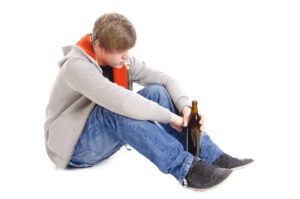Parents want the best for their kids. Mothers and fathers take steps to ensure their children have as little risk exposure as feasible. Preventing one’s son or daughter from making mistakes is no easy challenge; a task which gets more difficult as children mature. The majority of people with children shield their kids from engaging in alcohol and substance use as much as possible. Many parents understand the risks of developing unhealthy relationships with substances at a young age, notably the risk of alcohol use disorder or drug addiction.
Going one step further, a good number of parents grasp the susceptibility of developing brains. Adolescents who experiment with drugs and alcohol use are at an exponentially higher risk of developing alcohol or substance use disorders. With that in mind, it’s entirely critical that parents not do anything that might encourage the development of such problems.
There is a mindset shared by a good many parents, the idea that teenage alcohol use is safe when they, as parents, manage the conditions of use. The resignation that teens are going to drink alcohol regardless of the wisdom imparted to them by their elders leads to the above course of thinking. Some parental units decide that they alone can teach their children how to deal with alcohol responsibly, i.e., moderation, not drinking and driving, etc. Notwithstanding parents’ ability to justify supplying their teens with alcohol, scientific evidence suggests that the behavior may lead to more detriment than benefit.
Parental Provision of Alcohol Use
A long-term study involving 1927 teenagers aged 12 to 18 and their parents, should help to debunk some of the myths mothers and fathers have about alcohol. The six-year analysis shows no significant benefits tied to providing teens alcohol, The Lancet reports. In fact, one could interpret the findings as evidence that parental provisional alcohol use heightened the risk of problems down the road. The researchers point out that alcohol use is the number one cause of “death and disability in 15-24-year-olds globally.”
The research indicates that when parents supply teens with alcohol in one year, it doubled the risk the teens would access alcohol from other people in the following year, according to the article. The same teens were found at most significant risk of engaging in binge drinking and experiencing harm from alcohol use; notably, alcohol abuse, dependence, and alcohol use disorders. There’s no evidence to support the idea that parents supplying teens with alcohol leads to responsible alcohol use.
In many countries, parents are a key provider of alcohol to their children before they are of legal age to purchase alcohol. This practice by parents is intended to protect teenagers from the harms of heavy drinking by introducing them to alcohol carefully, however, the evidence behind this has been limited,” says lead author Professor Richard Mattick, University of New South Wales. “Our study is the first to analyse parental supply of alcohol and its effects in detail in the long term, and finds that it is, in fact, associated with risks when compared to teenagers not given alcohol. This reinforces the fact that alcohol consumption leads to harm, no matter how it is supplied. We advise that parents should avoid supplying alcohol to their teenagers if they wish to reduce their risk of alcohol-related harms.”
Binge Drinking
The Centers for Disease Control and Prevention (CDC) defines binge drinking as when men consume 5 or more drinks, or women consume 4 or more drinks in about 2 hours. Essentially, drinking an excessive amount of alcohol in a short period. The risks of this behavior are many, and young people rarely understand the inherent pitfalls of heavy alcohol use. What’s more, parents are not an exception; otherwise, they may think twice about introducing their children to alcohol in any environment.
At the end of the study, binge drinking was reported among:
- 81% of teenagers who accessed alcohol through their parents and others reported binge drinking.
- 62% of those who accessing alcohol from other people only.
- 25% of teens whose only supply came from parents.
It’s worth mentioning that the longer a person refrains from substance use of any kind, the better. Adolescence does not end until a person is in their mid-twenties, which means the brain is still developing. Exposing our most important organ to alcohol while it’s taking shape can cause many problems, including mental illness. The effects alcohol has on the brain tend to be more pronounced when heavy alcohol use occurs. Notwithstanding the laws that allow for alcohol use, everyone can benefit from using alcohol as intermittently and sparingly as possible.
Alcohol Use Disorder Treatment
Adolescent alcohol use often progresses to alcohol use disorder in young adulthood. Once that transition occurs, there is no turning back the clock. However, those caught in the grips of alcoholism can recover, provided they have help.



